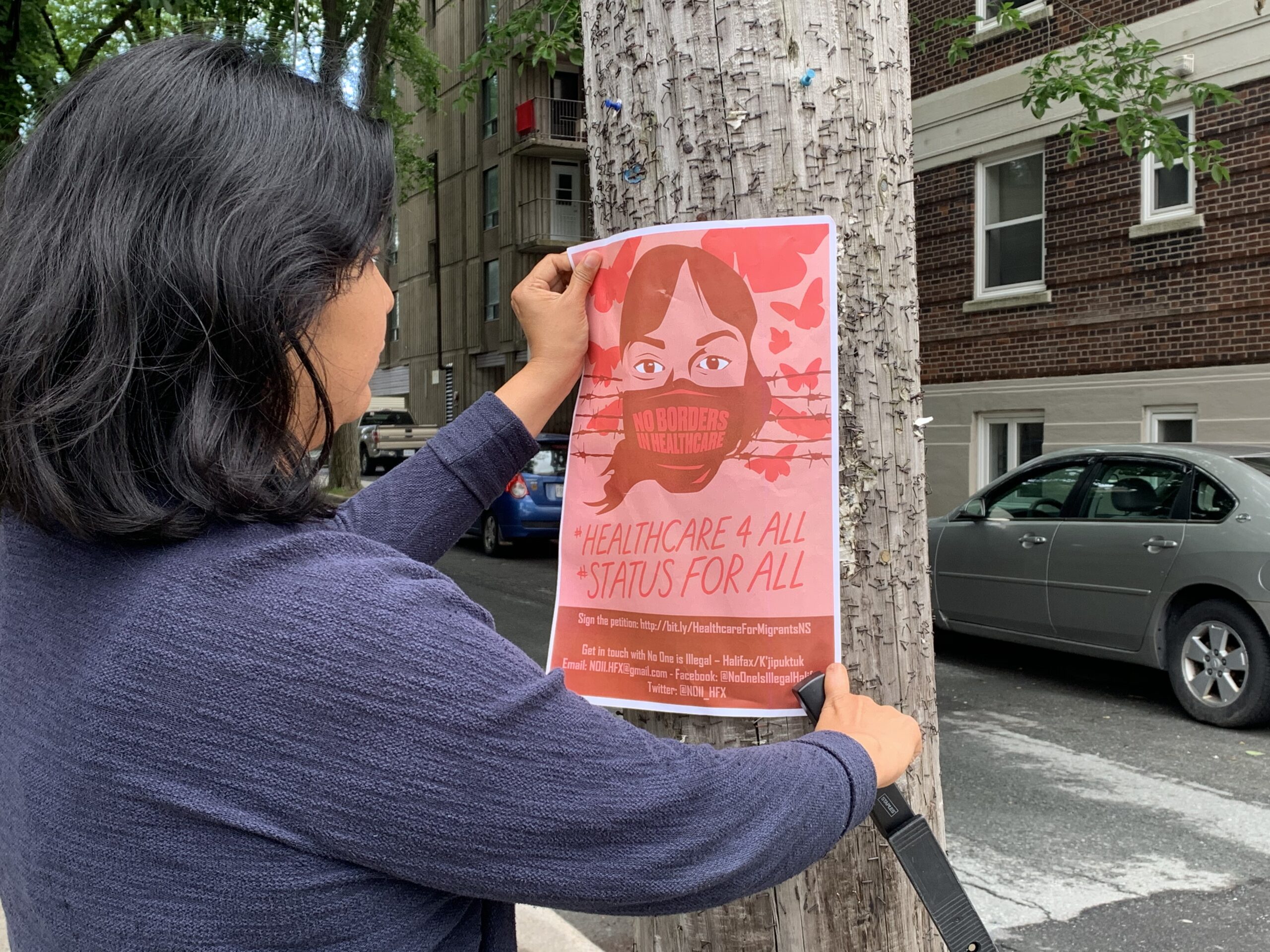
KJIPUKTUK (Halifax) – While many Nova Scotians are getting their second dose of the COVID-19 vaccine, there are migrant workers who want to be vaccinated and who haven’t yet received their first dose. At the same time, there are migrant workers who are being pressured to get the vaccine.
For this racialized workforce with precarious immigration status, vaccine access is an urgent issue of racial inequity that must be addressed.
For the past few months, No one is illegal — Halifax / Kjipuktuk has been on the front lines, filling gaps in the province’s vaccine rollout for migrant workers. Through our Migrant Workers Program, we have supported migrant workers throughout the province in accessing the COVID-19 vaccine. This has included fielding countless questions from migrant workers about the vaccine, being on hold for hours on end to make vaccine appointments, helping them to fill out required forms, providing interpretation and accompaniment during vaccine appointments, and more.
Many of the migrant workers we have supported are Jamaican and Mexican workers in the Seasonal Agricultural Worker Program (SAWP). They are the backbone of the agricultural sector in Nova Scotia. Under this program, migrant workers must live in employer-provided housing. These shared living quarters are often overcrowded and in poor condition, putting migrant workers at increased risk of COVID-19. For this reason, Canada’s National Advisory Committee on Immunization (NACI) recommended that migrant workers in shared living settings be a priority for early COVID-19 immunization.
While Nova Scotia made a commitment in January 2021 to prioritize migrant workers in our vaccine rollout, this never materialized. Nova Scotia’s vaccine plan provided early immunization to other essential workers and vulnerable communities, but this was not the case for migrant workers. Instead, migrant workers have had to wait for their age group to be called. This, in addition to many other barriers, has led to a major delay in vaccine access, which has put some in jeopardy of not being able to access the second dose before the end of their seasonal contracts.
On June 9, the province’s chief medical officer, Dr. Robert Strang, commented that the province would work to make sure that migrant workers receive access to their second dose. However, when questioned, officials did not share their plan for ensuring this; and time is running out.
The province has not made vaccine bookings accessible to migrant workers. Since SAWP migrant workers don’t have access to provincial health care in Nova Scotia, they must book their appointments by phone. However, most migrant workers do not have phone plans in Canada, making it impossible for many to do so on their own.
Nova Scotia’s vaccine plan for migrant workers hinges on employers. For example, the province hired a third party to assist employers with vaccine booking for migrant workers. In some cases, vaccinations for migrant workers have been done in hotels, after the 14-day isolation period. Again, these bookings have been through employers.
Can you imagine as a Nova Scotian having to rely on your employer to book your vaccine for you?
Such an approach doesn’t take into account the unique vulnerability faced by migrant workers. Migrant workers come to Canada on closed work permits, which means they are tied to one employer. This increases the risk of employer abuse. If they stand up for their rights, they can be fired, sent back to their home country and barred from returning through the SAWP. Putting vaccine bookings in the hands of employers increases the risk of coercion and reprisals against migrant workers.
We have heard numerous reports of migrant workers whose employers have threatened to either send them home or not call them back again to work next season if they do not get the vaccine. One Jamaican migrant worker who was pressured by his employer to get the vaccine told me: “It’s because I’m Black.”
Indeed, while Nova Scotians are able to make their own health decisions freely, including with regards to the vaccine, this is often not the case for racialized migrant workers. Migrant workers, for example, must rely on their employers to access medical attention, including for transportation and in some cases permission.
It’s incumbent upon health officials to provide migrant workers with accessible vaccine education to support their decision-making. This was one of the recommendations in a letter we and other members of the Migrant Worker Rights Working Group sent to provincial officials in May 2021, when we outlined the many barriers to vaccine access faced by migrant workers.
So far, the province has simply translated some documents on the vaccine in different languages. However, there is an ongoing lack of culturally relevant materials, as well as alternate formats for those who may have varying levels of literacy. For this reason, we hosted online vaccine education workshops geared towards Caribbean and Latin American migrant workers last month.
We continue to call for mobile vaccine clinics near where migrant workers live and work. This approach would ensure low-barrier access to the vaccine, without relying on employers for transportation or to make the booking. We are also urging the province to ensure that migrant workers can attend vaccination appointments without loss of pay, and to enact anti-reprisal protections for migrant workers in relation to the vaccine. In addition, we continue to advocate for access to public health care for all migrants, as well as full and permanent immigration status for all migrants.
To date, our ongoing advocacy around vaccine access for migrants has resulted in some changes. For example, we were informed by provincial officials this past week that a phone-based interpretation service, which was previously only available at 10 clinics in Nova Scotia, will finally be available in pharmacies throughout the province.
The ongoing de-prioritization of migrant workers in Nova Scotia’s vaccine rollout, the ability for employers to exercise such control over the health decisions of migrant workers, lack of access to public health care for people with precarious immigration status and an exclusionary immigration system that keeps migrant workers as temporary residents despite the fact that many have been coming here for years — these are all examples of racial injustice that must be addressed by provincial and federal officials. During the upcoming election cycle and beyond, let’s ensure that racial justice for migrant workers is a priority. Migrant workers have waited long enough.
Stacey Gomez is a migrant justice organizer with No One Is Illegal – Halifax/K’jipuktuk and active in the Latin American solidarity movement.
See also: Nova Scotia’s vaccine access not working for migrants, advocates and health experts say
Check out our new community calendar!
With a special thanks to our generous donors who make publication of the Nova Scotia Advocate possible.
Subscribe to the Nova Scotia Advocate weekly digest and never miss an article again. It’s free!



